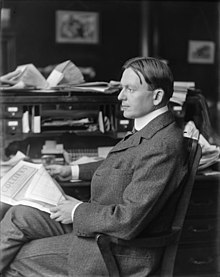Robert Collier (author)

This article needs additional citations for verification. (January 2017) |
| Part of a series of articles on |
| New Thought |
|---|
|
Robert Collier (April 19, 1885 in St. Louis, Missouri – 1950) was an American author of self-help and New Thought metaphysical books in the 20th century. He was the nephew of Peter Fenelon Collier, founder of Collier's Weekly. He was involved in writing, editing, and research for most of his life. His book The Secret of the Ages (1926) sold over 300,000 copies during his life. Collier wrote about the practical psychology of abundance, desire, faith, visualization, confident action, and personal development.
Robert Collier Publications, Inc. still exists through the efforts of his widow, and now his children, grandchildren, and great-grandchildren. Collier's books, which have been popular with self-help and New Thought groups, have been brought back to prominence from being referenced in the popular metaphysical movie The Secret. In the book The Secret Rhonda Byrne writes: "The glimpse came in a hundred-year-old book, given to me by my daughter Hayley".[1][citation needed]
Selected books written by Collier[]
- Copywriting & Direct Marketing
- The Robert Collier Letter Book
- How To Make Money At Home In Spare Time By Mail
- The God in You
- The Magic Word
- The Secret of the Ages (1926)[2]
- The Secret Power
- Riches Within Your Reach: The Law of the Higher Potential
- Be Rich! The Science of Getting What You Want
- The Book of Life (Volumes 1-7) 1925
Quotes[]
- "You must intensify and render continuous by repeatedly presenting with suggestive ideas and mental pictures of the feast of good things, and the flowing fountain, which awaits the successful achievement or attainment of the desires."
- "The first principle of success is desire--knowing what you want. Desire is the planting of your seed. Very few persons, comparatively, know how to Desire with sufficient intensity. They do not know what it is to feel and manifest that intense, eager, longing, craving, insistent, demanding, ravenous Desire which is akin to the persistent, insistent, ardent, overwhelming desire of the drowning man for a breath of air; of the shipwrecked or desert-lost man for a drink of water; of the famished man for bread and meat… "
References[]
External links[]
- Robert Collier Publications – with list of books by Collier
- Robert Collier at Library of Congress Authorities, with 15 catalog records
- 1885 births
- 1950 deaths
- American spiritual teachers
- American spiritual writers
- New Thought writers